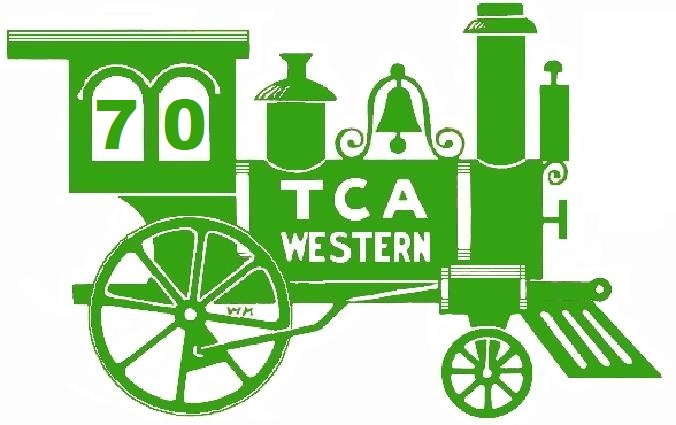 Penn-Line was an American HO train manufacturer located in Boyertown, Pennsylvania. The company was founded in 1947 by Albert
M. Mercer, K. Linwood Stauffer and Robert Faust, hobbyists who believed that most of the model railroad equipment produced at
that time lacked realism. Japan and Germany produced little due to the recently ended World War II, while the main United
States train model brands at that time, Lionel Corp. and American Flyer, did not
put as much authentic detail on their trains as their 'O' and 'S' gauges would have allowed.
Penn-Line was an American HO train manufacturer located in Boyertown, Pennsylvania. The company was founded in 1947 by Albert
M. Mercer, K. Linwood Stauffer and Robert Faust, hobbyists who believed that most of the model railroad equipment produced at
that time lacked realism. Japan and Germany produced little due to the recently ended World War II, while the main United
States train model brands at that time, Lionel Corp. and American Flyer, did not
put as much authentic detail on their trains as their 'O' and 'S' gauges would have allowed.

 Penn Line's early contribution to model railroading was the use of printer's lead to cast the locomotives.
This allowed very fine detail in the castings, much greater detail than could be achieved from stampings. And while the larger
'O' gauge and 'S' gauge had the potential for more detail, Penn Line's founders chose to use the smaller HO gauge. Their
thinking was that the potential for realism coming from more elaborate layouts made HO the best compromise. This was at a
time when HO gauge was far from the standard it is today. Penn Line produced about a half dozen different locomotives based
on prototypes from the Pennsylvania Railroad, hence the choice of the company name Penn Line.
Penn Line's early contribution to model railroading was the use of printer's lead to cast the locomotives.
This allowed very fine detail in the castings, much greater detail than could be achieved from stampings. And while the larger
'O' gauge and 'S' gauge had the potential for more detail, Penn Line's founders chose to use the smaller HO gauge. Their
thinking was that the potential for realism coming from more elaborate layouts made HO the best compromise. This was at a
time when HO gauge was far from the standard it is today. Penn Line produced about a half dozen different locomotives based
on prototypes from the Pennsylvania Railroad, hence the choice of the company name Penn Line.
 In the early years of the company new locomotives were added to the line at a rate of about one a year.
They were sold mainly as build-it-yourself kits. This meant that purchasers were required to follow a detailed set of
instructions to put all the parts together, and they had to remove flashing from the die-cast parts using a file, scraper or
knife. The market for these Penn Line products was clearly the serious model railroad enthusiast. Only one kit was simple
enough for a youngster to assemble. That was the Whitcomb Midget Diesel Switcher. The other kits competed in quality and
precision with anything on the HO market at that time. The early line of HO locomotives consisted of a Pennsylvania RR E6
Atlantic, H-9 Consolidation, I-1 Decapod, K-4 Pacific, L-1 Mikado, GG-1 Electric, a T-1 4-4-4-4, all
Pennsylvania Railroad prototypes, and a Reading Streamlined 4-6-2 Crusader. The steam locomotive models utilized boilers
and frames that were entirely made of die-cast metal, thus they are heavy. As a result, they are generally good pullers. Loco
models were primarily sold in kit form, however, many assembled versions of the model kits have shown up in hobby stores from
time to time, as shop owners built a few for display purposes. Penn Line locomotives used Pittman
electric motors and operated on 12 volt DC current over 2-rail track. The PRR E6 Atlantic sold for $29.50, the H-9
Consolidation was priced at $32.50, the PRR T-1 4-4-4-4 was $39.50 and featured a twin drive mechanism with all drivers
powered, the L-1 Mikado was $34.50 and the K-4 Pacific was list priced at $34.50. In the mid 1950's Penn Line added
F-7 diesel locomotives with plastic shells, and in the late 1950's GP9 diesels with plastic shells were also added to the
roster. The GP9's can be found in Baltimore & Ohio, Great Northern, Santa Fe, Union Pacific and Wabash road names.
In the early years of the company new locomotives were added to the line at a rate of about one a year.
They were sold mainly as build-it-yourself kits. This meant that purchasers were required to follow a detailed set of
instructions to put all the parts together, and they had to remove flashing from the die-cast parts using a file, scraper or
knife. The market for these Penn Line products was clearly the serious model railroad enthusiast. Only one kit was simple
enough for a youngster to assemble. That was the Whitcomb Midget Diesel Switcher. The other kits competed in quality and
precision with anything on the HO market at that time. The early line of HO locomotives consisted of a Pennsylvania RR E6
Atlantic, H-9 Consolidation, I-1 Decapod, K-4 Pacific, L-1 Mikado, GG-1 Electric, a T-1 4-4-4-4, all
Pennsylvania Railroad prototypes, and a Reading Streamlined 4-6-2 Crusader. The steam locomotive models utilized boilers
and frames that were entirely made of die-cast metal, thus they are heavy. As a result, they are generally good pullers. Loco
models were primarily sold in kit form, however, many assembled versions of the model kits have shown up in hobby stores from
time to time, as shop owners built a few for display purposes. Penn Line locomotives used Pittman
electric motors and operated on 12 volt DC current over 2-rail track. The PRR E6 Atlantic sold for $29.50, the H-9
Consolidation was priced at $32.50, the PRR T-1 4-4-4-4 was $39.50 and featured a twin drive mechanism with all drivers
powered, the L-1 Mikado was $34.50 and the K-4 Pacific was list priced at $34.50. In the mid 1950's Penn Line added
F-7 diesel locomotives with plastic shells, and in the late 1950's GP9 diesels with plastic shells were also added to the
roster. The GP9's can be found in Baltimore & Ohio, Great Northern, Santa Fe, Union Pacific and Wabash road names.

 By the mid-1950's Penn Line knew that the market demanded complete train sets and ready-to-run trains. In order to compete, in
1955 they beagn to issue complete sets of ready-to-run trains. These sets usually consisted of a pre-built loco, a half dozen
or less cars, and enough snap track to make a simple loop. Because Penn Line did not have its own tooling to produce the
freight and passenger cars for the sets, in the early years they utilized cars and accessories from other manufacturers.
Eventually, some freights were self-developed and combined with the 3rd party cars in the sets, and passenger car
tooling was acquired. The train sets were generally repackaged every year and offered in multiple combinations of several
different road names. Penn Line locomotive models were still made available individually as both kits and finished models.
By the mid-1950's Penn Line knew that the market demanded complete train sets and ready-to-run trains. In order to compete, in
1955 they beagn to issue complete sets of ready-to-run trains. These sets usually consisted of a pre-built loco, a half dozen
or less cars, and enough snap track to make a simple loop. Because Penn Line did not have its own tooling to produce the
freight and passenger cars for the sets, in the early years they utilized cars and accessories from other manufacturers.
Eventually, some freights were self-developed and combined with the 3rd party cars in the sets, and passenger car
tooling was acquired. The train sets were generally repackaged every year and offered in multiple combinations of several
different road names. Penn Line locomotive models were still made available individually as both kits and finished models.
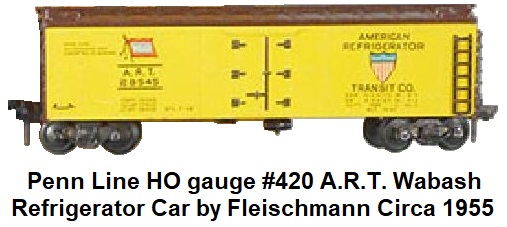
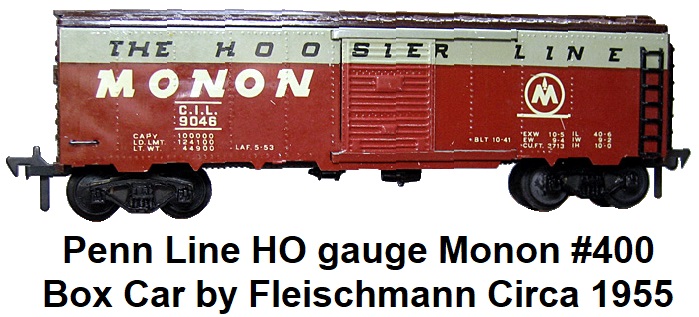 In the early years passenger and freight cars were supplied to Penn Line for their sets by
Fleischmann. The Northern Pacific 60' passenger cars were produced by Fleischmann for Penn Line
in 1955 and 1956. These streamlined cars featured interior illumination. There were four die-cast cars, mail/baggage, coach,
club car and a Pullman. They came in two sets, #5503 (F-7A unit, #520 mail/baggage car, #540 club car and #530 coach) and
#5506 (F-7 A&B units, #520 mail/baggage, #530 coach, #540 club car and #550 Pullman sleeper). The F-7 locomotive was from
Athearn. These same F-7 diesels headed up 2 freight sets as well, in 1955. Later on, Penn Line just
used Athearn one-piece plastic F-7 shells mounted on Penn Line die-cast metal frames and drives with the electric motor
mounted over the rear truck. The F-7 B unit was fitted with an operating diesel horn and remote controller. The
Fleischmann-supplied freight cars were the #400 Monon 'The Hoosier Line' box car, #420 Wabash ART reefer, and #440 Western
Maryland gondola. The Fleischmann cars were phased out by 1960 and that is when the switch to Varney/Hobbyline plastic
passenger cars was made. Varney also made the C&O hopper and Sinclair tank car for Penn Line.
In the early years passenger and freight cars were supplied to Penn Line for their sets by
Fleischmann. The Northern Pacific 60' passenger cars were produced by Fleischmann for Penn Line
in 1955 and 1956. These streamlined cars featured interior illumination. There were four die-cast cars, mail/baggage, coach,
club car and a Pullman. They came in two sets, #5503 (F-7A unit, #520 mail/baggage car, #540 club car and #530 coach) and
#5506 (F-7 A&B units, #520 mail/baggage, #530 coach, #540 club car and #550 Pullman sleeper). The F-7 locomotive was from
Athearn. These same F-7 diesels headed up 2 freight sets as well, in 1955. Later on, Penn Line just
used Athearn one-piece plastic F-7 shells mounted on Penn Line die-cast metal frames and drives with the electric motor
mounted over the rear truck. The F-7 B unit was fitted with an operating diesel horn and remote controller. The
Fleischmann-supplied freight cars were the #400 Monon 'The Hoosier Line' box car, #420 Wabash ART reefer, and #440 Western
Maryland gondola. The Fleischmann cars were phased out by 1960 and that is when the switch to Varney/Hobbyline plastic
passenger cars was made. Varney also made the C&O hopper and Sinclair tank car for Penn Line.
Penn Line HO Cast Metal Passenger Cars Produced by Fleischmann




The tooling for the streamline and heavyweight standard passenger cars was obtained from the John English
Company (Hobbyline) when it ceased operations. They were first cataloged in 1957. Several sets were produced featuring these
cars, pulled by all of the different Penn Line locomotives through 1963. All cars came with interior illumination. The
heavyweight standard passenger car lineup consisted of a #362 baggage car, #365 combine, #366 diner, #360 coach, #361 Pullman
and #369 observation car. The streamliner cars were available in #372 baggage car, #373 baggage/mail car, #370 coach, #380
vista dome, #382 vista dome diner, #387 full dome and #375 observation car. Santa Fe, Great Northern, New Haven, Southern
Pacific, Baltimore & Ohio, Milwaukee Road, Pennsylvania RR, and Denver & Rio Grande were the eight available road names for
both passenger car styles.
Penn Line HO Heavyweight Standard Passenger Cars obtained from the John English Company (Hobbyline)





Besides Great Northern, early Penn Line F-7A unit diesels were available in Chicago Burlington & Quincy and
Southern Pacific liveries. These early diesels had metal truck side frames. Additional road names Santa Fe, Baltimore & Ohio,
The Milwaukee Road, New Haven, Pennsylvania Railroad, Rio Grande, and Union Pacific were added later, but these had plastic
truck side frames. The powered F-7A locos sold in the early 1960's for $9.95 with a dummy offered for $3.50. Matching F-7B
units were available from Penn Line in the same road names, power options, and pricing. A notable HO train set produced by
Penn-Line in 1962 was the #6214 Pennsylvania streamline passenger set, pulled by matching F-7 A unit diesel locomotives.
Penn-line chose a tuscan red with a yellow single stripe to decorate the locos. It used the acquired
Hobbyline/Varney streamline passenger cars. The Hobbyline cars were in all silver with a gold stripe
and black lettering.
Penn Line HO Streamlined Passenger Cars obtained from the John English Company (Hobbyline)


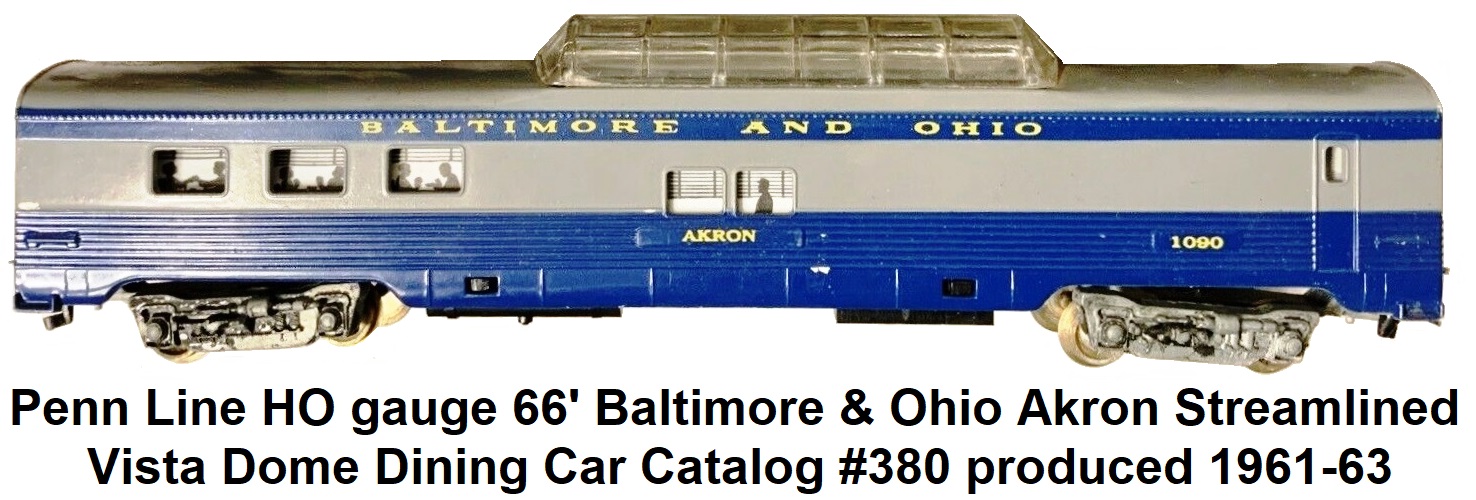
Mantua provided Penn Line with box cars and gondolas for their sets. Tyco produced
the box cars, Wilson Reefer and gondolas for Penn Line from 1957 to 1963. The Mantua/Tyco box cars produced for Penn Line came
in Great Northern, Union Pacific, D&RGW Cookie Box, New Haven, Missouri Pacific Eagle with yellow door, Western Pacific
Feather, and Main Central road names. Gondolas were decorated for the Pennsylvania RR, Wabash, Baltimore & Ohio, and Monon.
These cars are all easily identified by the Penn Line logo on the car bottom. Eventually Penn Line manufactured one of their
own freight cars. The only freight rolling stock Penn Line produced itself consisted of a series of metal flat cars, some
with loads. Penn Line also utilized some Athearn GP7 shells on their own power chassis to create
their GP9 diesels.
Penn Line HO 40' Steel Box Cars Supplied by Mantua/Tyco

Penn Line HO In-house Produced Flat Cars

Miscellaneous Penn Line HO Freight Cars

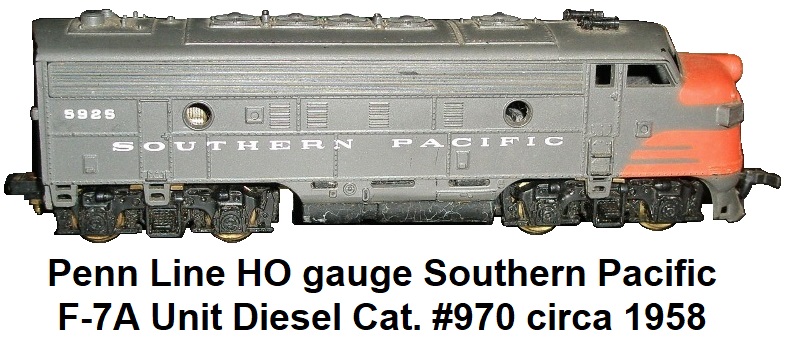 The 1959 Penn Line catalog offered set #5805 headed by an E-6 Atlantic 4-4-2 loco and came with a
heavyweight standard combine and passenger coach. The cars were illuminated by Penn Line's 'Ever-Glow' lighting. This set
sold for $44.50. Set #5806 was a freight set headed by the K-4 Pacific 4-6-2 Loco and featured a trailer on flat car, box
car, flat car with wood load and caboose. It sold for $54.95. Set #5807 was also headed by the K-4, but was a passenger
consist with a heavyweight standard combine and 2 coaches. It sold for $54.95. Set #5808 was a freight set headed by the I-1
Decapod 2-10-0 pulling a flat with pipes, box car, hopper, searchlight car and caboose. It was priced at $59.95. Two sets
were offered that were headed up by a GP9 diesel that were offered in 5 different road names. One set was a 4-car freight
train and the other was a 3-car passenger set consist of heavyweight standard cars, both priced at $19.95. Two different
passenger trains pulled by F-7 A&B diesels were also offered. One set had 4 heavyweight standard cars and the other
pulled 4 of the streamlined type cars. These sets were made in 5 road names each and sold for $24.95. There were also 3
different sets pulled by a GG-1 loco. These sets were 2 passenger consists and 1 freight train, each priced at $39.95.
The 1959 Penn Line catalog offered set #5805 headed by an E-6 Atlantic 4-4-2 loco and came with a
heavyweight standard combine and passenger coach. The cars were illuminated by Penn Line's 'Ever-Glow' lighting. This set
sold for $44.50. Set #5806 was a freight set headed by the K-4 Pacific 4-6-2 Loco and featured a trailer on flat car, box
car, flat car with wood load and caboose. It sold for $54.95. Set #5807 was also headed by the K-4, but was a passenger
consist with a heavyweight standard combine and 2 coaches. It sold for $54.95. Set #5808 was a freight set headed by the I-1
Decapod 2-10-0 pulling a flat with pipes, box car, hopper, searchlight car and caboose. It was priced at $59.95. Two sets
were offered that were headed up by a GP9 diesel that were offered in 5 different road names. One set was a 4-car freight
train and the other was a 3-car passenger set consist of heavyweight standard cars, both priced at $19.95. Two different
passenger trains pulled by F-7 A&B diesels were also offered. One set had 4 heavyweight standard cars and the other
pulled 4 of the streamlined type cars. These sets were made in 5 road names each and sold for $24.95. There were also 3
different sets pulled by a GG-1 loco. These sets were 2 passenger consists and 1 freight train, each priced at $39.95.
 The cast metal GG-1 was a notable part of the Penn Line. Production started in 1956. The GG-1 was not built to scale, it was
made shorter in order to navigate around 18" radius curves. Other than the prototypical Pennsylvania RR herald, several
fantasy versions were offered over the years including New Haven, Southern Pacific, and Great Northern. Catalog price for a
Penn Line GG-1 in 1958 was $49.50. These electric locos are hard to find
today and sell for very high prices at auctions when they do come up. When the NMRA (National Model Railroad Association)
designed and released their choice of a new common type HO coupler for American HO products, Penn-Line changed to this type
coupler.
The cast metal GG-1 was a notable part of the Penn Line. Production started in 1956. The GG-1 was not built to scale, it was
made shorter in order to navigate around 18" radius curves. Other than the prototypical Pennsylvania RR herald, several
fantasy versions were offered over the years including New Haven, Southern Pacific, and Great Northern. Catalog price for a
Penn Line GG-1 in 1958 was $49.50. These electric locos are hard to find
today and sell for very high prices at auctions when they do come up. When the NMRA (National Model Railroad Association)
designed and released their choice of a new common type HO coupler for American HO products, Penn-Line changed to this type
coupler.
Penn Line, like Varney, utilized a zinc alloy for their car frames, the entire flat car bodies, and
sideframes on freight cars. There were impurities in the zinc alloy and as a consequence the truck side frames are often
found crumbling or as dust.
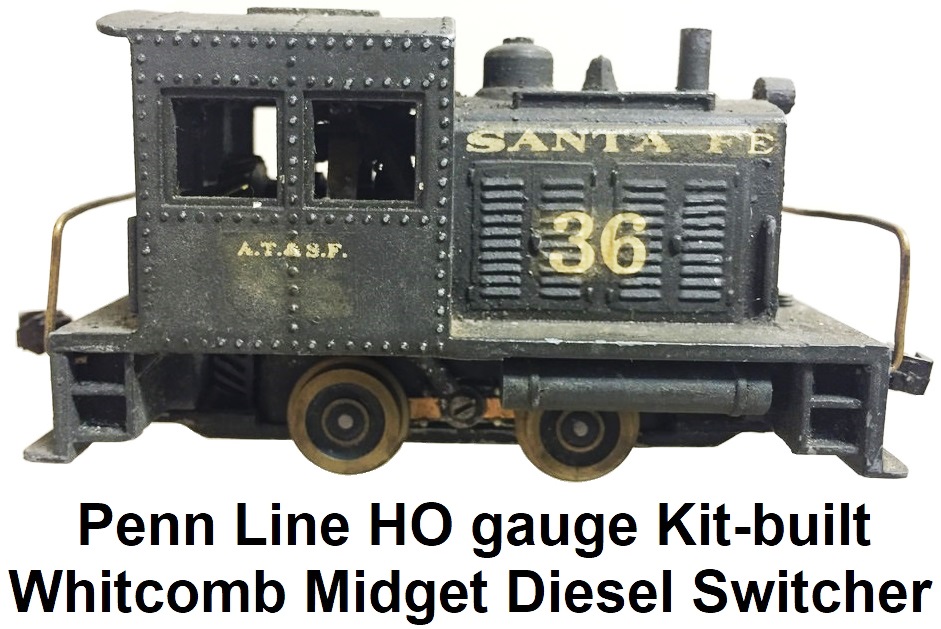 The Penn Line-produced small 0-4-0 Whitcomb D2 Mini-Diesel Switcher locomotive kit was very popular with hobbyists. In the
early 1960's, Penn Line entered the emerging slot car market. They attempted to bring the same realism that they had used in
model railroading to slot car racing. They produced a nicely detailed, but poorly powered Indianapolis-style set endorsed by
A. J. Foyt. Problems with this product caused Penn Line to declare bankruptcy in the fall of 1963.
The Penn Line-produced small 0-4-0 Whitcomb D2 Mini-Diesel Switcher locomotive kit was very popular with hobbyists. In the
early 1960's, Penn Line entered the emerging slot car market. They attempted to bring the same realism that they had used in
model railroading to slot car racing. They produced a nicely detailed, but poorly powered Indianapolis-style set endorsed by
A. J. Foyt. Problems with this product caused Penn Line to declare bankruptcy in the fall of 1963.
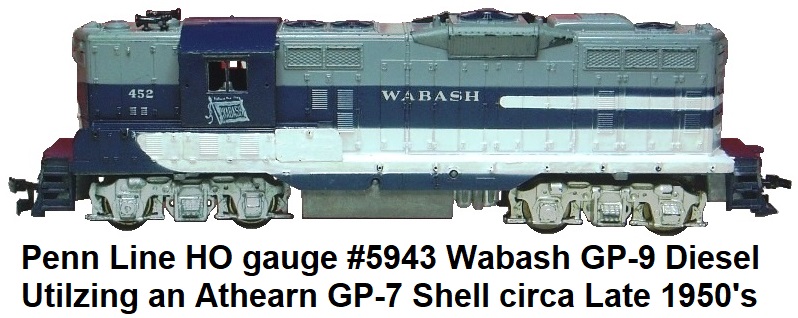 Sol Kramer, then owner of Varney/Life Like obtained the dies for all of the Penn Line rolling stock,
diesels and the GG-1 at the Penn Line bankruptcy auction in 1963. Varney continued to sell the Penn Line-made F-7A and F-7B
models, the GG-1 and the GP-9 until 1970. In spring 1970, Life-Like's branding took over Varney's line and these models
continued to be offered. The F-7A tooling survived into contemporary times with Walthers offering
entry-level trains under the Life-Like name. Lew English of Bowser Mfg. got the
PRR steam engine dies in 1963. Most of the former Penn Line Pennsylvania Railroad die-cast steam locomotive kits were later
produced by Bowser Manufacturing, and were still available in 2011, except for the Reading Crusader. The Crusader was made in
limited quantities by Penn Line, as only a single manufacturing run was performed and this locomotive is very hard to find
today. These locomotives have sold for as much as $2,000 and are coveted by collectors.
Sol Kramer, then owner of Varney/Life Like obtained the dies for all of the Penn Line rolling stock,
diesels and the GG-1 at the Penn Line bankruptcy auction in 1963. Varney continued to sell the Penn Line-made F-7A and F-7B
models, the GG-1 and the GP-9 until 1970. In spring 1970, Life-Like's branding took over Varney's line and these models
continued to be offered. The F-7A tooling survived into contemporary times with Walthers offering
entry-level trains under the Life-Like name. Lew English of Bowser Mfg. got the
PRR steam engine dies in 1963. Most of the former Penn Line Pennsylvania Railroad die-cast steam locomotive kits were later
produced by Bowser Manufacturing, and were still available in 2011, except for the Reading Crusader. The Crusader was made in
limited quantities by Penn Line, as only a single manufacturing run was performed and this locomotive is very hard to find
today. These locomotives have sold for as much as $2,000 and are coveted by collectors.
